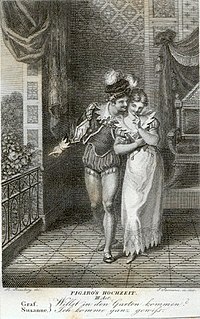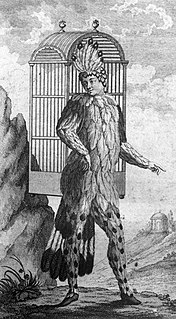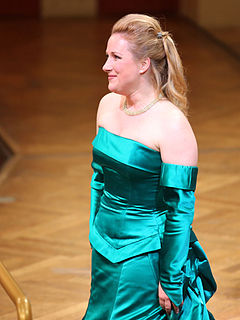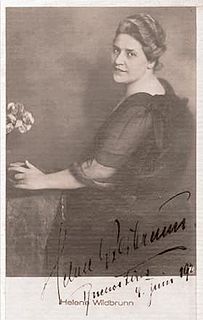
The Marriage of Figaro, K. 492, is an opera buffa in four acts composed in 1786 by Wolfgang Amadeus Mozart, with an Italian libretto written by Lorenzo Da Ponte. It premiered at the Burgtheater in Vienna on 1 May 1786. The opera's libretto is based on a stage comedy by Pierre Beaumarchais, La folle journée, ou le Mariage de Figaro, which was first performed in 1784. It tells how the servants Figaro and Susanna succeed in getting married, foiling the efforts of their philandering employer Count Almaviva to seduce Susanna and teaching him a lesson in fidelity.

Wolfgang Amadeus Mozart, baptised as Johannes Chrysostomus Wolfgangus Theophilus Mozart, was a prolific and influential composer of the classical era.

Otto Erich Deutsch was an Austrian musicologist. He is known for compiling the first comprehensive catalogue of Franz Schubert's compositions, first published in 1951 in English, with a revised edition published in 1978 in German. It is from this catalogue that the D numbers used to identify Schubert's works derive.

Maria Aloysia Antonia Weber Lange was a German soprano, remembered primarily for her association with the composer Wolfgang Amadeus Mozart.

Emanuel Schikaneder, born Johann Joseph Schickeneder, was a German impresario, dramatist, actor, singer, and composer. He wrote the libretto of Wolfgang Amadeus Mozart's opera The Magic Flute and was the builder of the Theater an der Wien. Peter Branscombe called him "one of the most talented theatre men of his era".

Max Deutsch was an Austrian-French composer, conductor, and academic teacher. He studied with Arnold Schönberg and was his assistant. Teaching at the Sorbonne and the École Normale de Musique de Paris, he influenced notable students such as Philippe Capdenat, Donald Harris, György Kurtág and Philippe Manoury. He tried to destroy all his own compositions.

Deutsch-Wagram is a town in Austria, in the Gänserndorf District of the federal state of Lower Austria. It is situated in the Marchfeld basin close to the Vienna city limits, about 15 km northeast of the city centre.

Elisabeth Schumann was a German soprano who sang in opera, operetta, oratorio, and lieder. She left a substantial legacy of recordings.

Diana Damrau is a German operatic soprano. She is particularly associated to works of Mozart, Strauss and the Italian bel canto repertory. Damrau is a Kammersängerin of the Bavarian State Opera.

(Maria) Josepha Weber was a German soprano of the classical era. She was a sister-in-law of Wolfgang Amadeus Mozart, and the first to perform the role of The Queen of the Night in Mozart's opera The Magic Flute (1791).

One of the longest adulthood journeys of Wolfgang Amadeus Mozart was a visit, beginning in Spring 1789, to a series of cities lying northward of his adopted home in Vienna: Prague, Leipzig, Dresden, and Berlin.

For the last seven years of his life Wolfgang Amadeus Mozart was a Mason. The Masonic order played an important role in his life and work.

Joseph Lange was an actor and amateur painter of the 18th century. Through his marriage to Aloysia Weber, he was the brother-in-law of Wolfgang Amadeus Mozart.
Johann Ignaz Ludwig Fischer, commonly called Ludwig Fischer, was a German opera singer, a notable bass of his time.
Cäcilia Cordula Stamm was the mother of Constanze Weber and the mother-in-law of Wolfgang Amadeus Mozart.
Andreas Schmidt is a German classical bass-baritone in opera and concert.

Leonore Helene Wildbrunn was an Austrian operatic soprano. She was a celebrated Wagnerian singer, possessing a wide vocal range and dramatic creativity and fine sense of style. She made her debut in 1907 at the Stadttheater Dortmund as a contralto and mezzo-soprano. She performed at the Stuttgart Court Opera from 1914 to 1918, the Berlin State Opera from 1919 to 1925, the Städtische Oper Berlin from 1925 to 1932, and the Vienna State Opera from 1919 until 1932. From 1932 to 1950, she only appeared as a concert singer, and taught at the Vienna Music Academy as a professor.
Helmut Erich Deutsch is an Austrian classical pianist, specialising in chamber music and lieder accompaniment.

Katharina Buchwieser was a German operatic soprano and actress. She was known as Cathinka, and her married surname was Lacsny von Folkusfálva. She appeared at theatres of Vienna, the Theater an der Wien and the Theater am Kärntnertor, then the court theatre. Franz Schubert dedicated compositions to her.
















